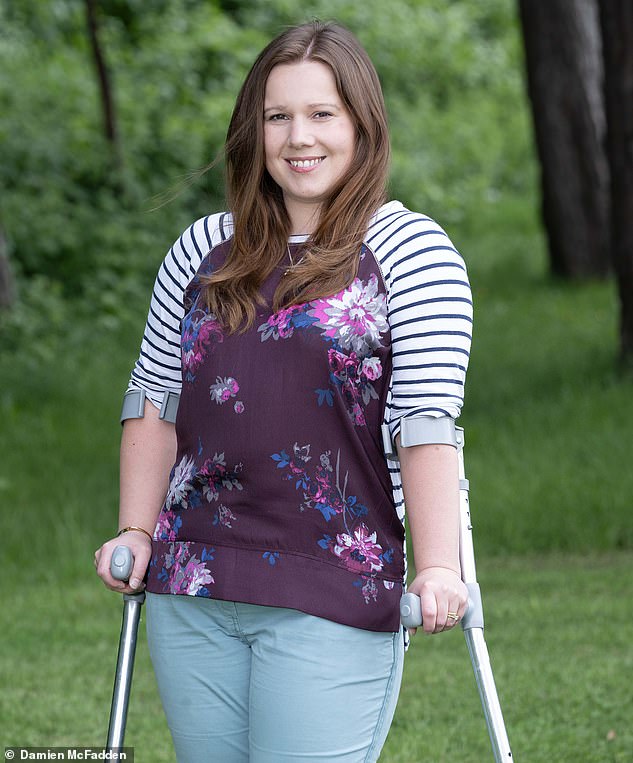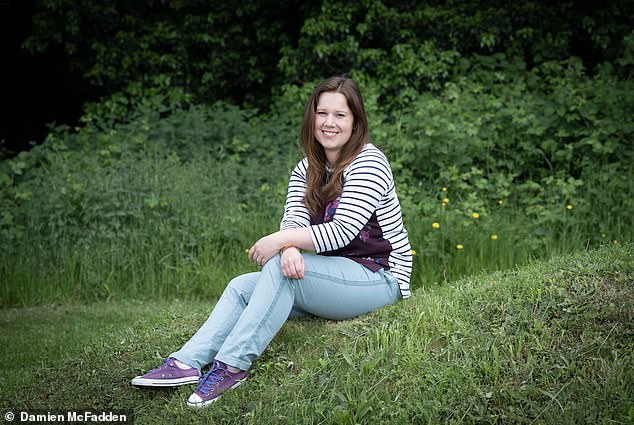While many of us go to bed hoping to get a good night’s sleep, Sarah Taylor dreads it. Because the 32-year-old has no idea what could happen at night: she could prepare a meal and eat it; she builds a pillow fort like a child; or go for a walk barefoot, all without knowing it.
Sarah, from Berkshire, suffers from extreme sleepwalking. During the nighttime episodes she woke up her husband James and argued with him, opened closed doors and even ended up on the street.
“Although it is a quiet road in a picturesque town, it is used by truckers looking for a break on the highway, so trucks often pass through it. It is dangerous,” he says.
It all started when Sarah was in college and she and her three housemates would often wake up to find doors ajar, cupboards open, and food everywhere.
“We even discussed whether we had a ghost, since this always happened at night,” he recalls.
Sarah Taylor, 32, suffers from extreme sleepwalking and is afraid to go to sleep at night because she has no idea what could happen.
Then one night, Sarah woke up to find herself at the kitchen counter, a loaf in one hand and the other in the cupboard, looking for something to spread on the bread.
“That’s when I knew they weren’t ghosts,” he says. “It was me, sleepwalking.”
Since then, she has often experienced unexplained cuts and bruises, or found her shoes in a completely different place than where she left them (because she had been outside while she was sleeping).
“I would never know how far I had gone; it was really scary,” he says.
One night he took the pillows from under James’ head while he slept and built a pillow fort on the floor, eyes wide open but fast asleep.
She recalls: ‘On another occasion, a tray of 12 donuts I had just bought were gone in the morning. I found the tray empty and the crumbs in the sink.
‘James told me that one night I stood there bragging about having been at a party with Batman.
“It sounds funny, but it’s also creepy for James to see me standing next to him, with my eyes open, most of the time, not speaking, as if my body was mobile but there was no one in my head.”
Stress seemed to make things worse, especially during preparations for their wedding day in 2014.
‘I would wake up sore and sore like I had done a great workout at the gym. It was due to sleepwalking and stress seemed to exacerbate it,” he says.
“James put locks on the doors and a deadbolt in our bedroom, but I found a way to open it even while I was sleeping.”
However, when she sought help from her GP, she was told nothing could be done.
As Professor Guy Leschziner, consultant neurologist at Guy’s and St Thomas’ Hospital, London, explains: “Sleepwalking is one of a number of conditions called non-REM parasomnias – abnormal behaviors arising from the deeper stages of sleep.”
Professor Leschziner, author of The Night Brain: Nightmares, Neuroscience and the Secret World of Sleep, adds: ‘What we think is happening is that during these very deep stages of sleep, partial awakening occurs. But it’s not the whole brain; some parts remain in very deep sleep, while others exhibit waking activity.’
It seems that the areas of the brain that remain dormant are often responsible for memory, rational decision-making and planning, which may explain why people do things that are not entirely appropriate.
“But the part of the brain responsible for wakefulness also deals with vision and movement.”
An estimated 1 to 2 per cent of adults in the UK are sleepwalkers, he adds, around 800,000 people.
Among children, the figure is closer to 20 percent, but most surpass it by adolescence, although 1 percent of young adults still sleepwalk regularly, according to Dr. Paul Reading, a neurologist and expert on sleep disorders. South Tees NHS dream. Foundation Trust.
Professor Leschziner adds: “We don’t fully understand why it should persist in certain adults.
“We know there is a strong genetic contribution, but it is probably also related to a number of environmental factors.”
These include lack of sleep, stress and alcohol: Sleepwalking is more likely to occur during deep sleep, in response to lack of sleep or certain medications; but it can also arise from poor or light sleep caused by stress or alcohol.
“For some people, alcohol is a very clear trigger, but for others it makes very little difference,” says Professor Leschziner.
“We also know that certain conditions, such as snoring or sleep apnea, can act as triggers, as can periodic limb movement disorder, which is similar to restless legs syndrome but causes nocturnal kicking that can precipitate these awakenings. partial”.
As for why most children give up sleepwalking over time, it’s probably because the deeper stages of sleep (those that occur within the first hour or so) tend to become shallower with age, even at the end. of adolescence, says Dr. Reading.
For Sarah, the key triggers are stress and dieting.
“If I restricted food during the day, I would eat it while sleepwalking,” he says.
‘So I stopped all diets. We also discovered that if my husband gently tapped the bed, I would come back to my side and get back in.’
Professor Leschziner says: “For most people, sleepwalking is quite benign and may simply involve getting up or moving objects.
‘But I have seen people who, for example, found themselves naked in a hotel lobby or locked outside their house in the middle of the night.
‘Then there are people who have physically hurt themselves or their partners, and people who jump out of windows and break bones. One person stabbed himself in the leg. For others, their injury may be related to jumping out of bed, breaking a vase or lamp, and cutting themselves.’
Dr. Reading adds that something that is often overlooked is the impact that sleepwalking has on the sleepwalker’s partner.
“The sleepwalker is usually not conscious and does not remember events even if he is agitated; his bed partner’s sleep is often disturbed and problems may arise if sleep talking reveals names of previous partners, for example, or if attempts are made to of intimate behavior in a state of sleepwalking.
Sarah was finally referred to a neurologist earlier this year and had an EEG test (an electroencephalogram) to monitor her brain activity, as well as blood tests and an MRI.
He is now on a waiting list to spend the night in a specialized clinic to monitor his sleep.

The main triggers for sleepwalking in Sarah are stress and diet. If she restricted her food intake during the day, she would go out and get it while she sleepwalked at night.
Her real concern is how “capable” she is when she sleepwalks.
She says: “Some people just walk around a room and talk, I can get up, get dressed and find a way to open a door.” She worries me about what she might do next: drive a car? It’s frightening.’
Professor Leschziner says that sleepwalkers’ eyes are usually open, so they can see where they are going. But “the degree of consciousness and cognitive ability is related to the part of the brain that is awake and the part that is asleep. I have a patient who drove a car and a motorcycle: he even parallel parked in reverse.”
‘Another famous case is that of Kenneth Parks, from Canada, who (in 1987) allegedly drove miles to his in-laws’ house, murdered his mother-in-law, attempted to kill his father-in-law and was deemed to be a sleepwalking event.
“So people can do extraordinarily complicated things.”
Treatment begins with simple measures such as controlling stress, avoiding lack of sleep and reducing alcohol consumption.
It is also important to address the sounds that may trigger an event.
“I have seen people suffer from sleepwalking because they are in a bed that creaks and the noise causes them to partially wake up,” says Professor Leschziner. “That’s why it’s important to ensure the environment is as controlled as possible.”
This includes taking precautions like putting locks on windows “if you know one of your tendencies is to open the window,” he adds. Other interventions include identifying any medications that may be exacerbating the condition.
For more complex cases, a sleep study (at a sleep clinic) can help identify hidden triggers, such as periodic limb movement disorder. But if all else fails, sleeping pills or certain types of antidepressants can help, says Professor Leschziner.
He adds that if your partner is a sleepwalker, “it’s best to very gently take them back to bed and get them out of danger”; yelling at someone in a “confused state can pose a risk of assault.”
Sarah, although happy to finally be on the path to diagnosis, feels it took a long time for GPs to take her seriously.
“I know some people find sleepwalking fun, but it’s actually really scary for both the sleepwalker and the person sharing their bed,” he says.
rude health
You will have heard about the gut microbiome (the community of bacteria and other microbes) and its influence on well-being. Now, researchers at the University of California, Los Angeles have discovered that the semen microbiome may be linked to male infertility.
They identified a particular microbe, Lactobacillus iners, that appears to have a direct impact, for example, on sperm motility, reported the journal Scientific Reports.

Researchers at the University of California, Los Angeles have discovered that the semen microbiome may be linked to male infertility

